You might find it easier to read the piece by clicking on this link. It looks rather better as a blog page than as an email.

You might find it easier to read the piece by clicking on this link. It looks rather better as a blog page than as an email.
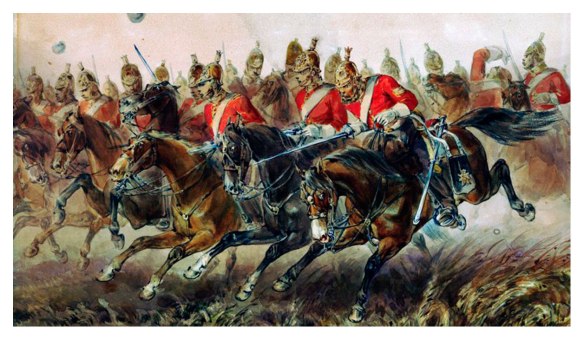
Did Johnson blunder?
On 25th June 2019, TalkRadio’s Ross Kempsell asked Boris Johnson – one of two contestants hoping to become leader of the Conservative Party (and thereby to become the UK’s next Prime Minister) – what would be the first thing he’d do after he had “written those letters to the submarine commanders?”
Johnson was rather vague but promised extra spending on education, railways, roads, police…
It was only 30 or so seconds into the interview but Kempsell clearly knew he had to sharpen things up, and fast. He interrupted Johnson:
RK: …and on Brexit?
BJ: [reaching out to RK] …Brexit! We will of course be pushing our plan into action. [scratches head] And getting ready to [points finger at camera] come out on October the… [gestures to RK for a prompt]
RK: …Thirty-first.
BJ : Correct! Thirty-first.
RK: Come what may?
BJ: Come what may.
RK: Do or die?
BJ: Do or die. Come what may.
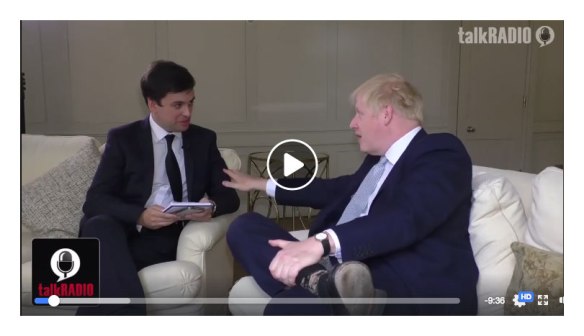
BJ reaches out to RK: “Brexit!”
You can watch the interview and see TalkRadio’s transcript here.
(This is my own transcript. TalkRadio’s version simplifies the interchanges, understating the extent to which the interviewer coaches or nudges Johnson – in short, puts words in his mouth. Johnson obligingly regurgitates.)
“Do or Die” created a mini-media storm and became the catchphrase of Johnson’s campaign thus far.
Here’s a small selection of sightings, as they appeared on Google’s “Top Stories” on 28/29 June 2019:
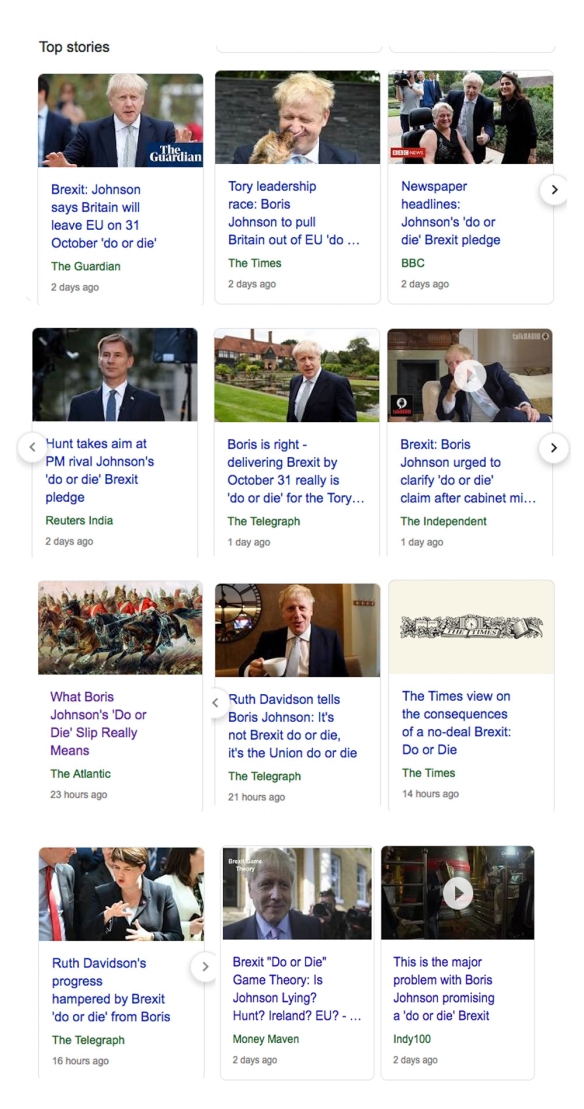
It didn’t take long for one of his earlier rivals, Rory Stewart, to tell Johnson that he’d blundered. As The Independent reported:
Brexit: Boris Johnson urged to clarify ‘do or die’ claim after cabinet minister points out phrase refers to suicidal army mission
International development secretary Rory Stewart says he is ‘troubled’ by comparison with disastrous Crimean War battle
Boris Johnson has been urged to clarify his “do or die” pledge to deliver Brexit by 31 October after a cabinet minister pointed out that the phrase originally referred to a disastrous British army mission.
Rory Stewart, the international development secretary, who initially stood against Mr Johnson in the Tory leadership race, said he was “troubled” by the current frontrunner’s language.
The phrase “do or die” originates from the poem “The Charge of the Light Brigade” by Alfred Tennyson, which is about British casualties during the Crimean War.
The Light Brigade of around 600 men suffered major losses after charging into Russian artillery fire during a battle in 1854, following a miscommunication between military commanders.
Mr Stewart called on Mr Johnson to “clarify” his comments and confirm that he did not see a no-deal Brexit as a kind of suicide mission.
He told the Press Association: “It was a very strange phrase to say ‘do or die’ because it’s taken from that Tennyson poem.
“I’m a little bit troubled by that. I hope he’s not setting it up in those kinds of terms. I don’t quite understand why he would agree with that kind of language.
“What I would hope he meant and I’d hope he’d clarify and say is that he’s going to try to deliver a Brexit that works for Britain…that this isn’t some sort of charge towards the guns.”
Mr Stewart had earlier tweeted paraphrasing the full section of the poem, which reads: “Theirs not to reason why, theirs but to do and die, into the valley of Death, rode the six hundred.”
[Source: The Independent.]
And then people started to point out that the phrase was not in fact “Do or die” but “Do AND die” (see e.g. this letter in The Guardian on 26 June).
Quite a different thing.
“Do OR die” implies there is no choice, and that a failure to act will necessarily result in defeat. But “do AND die” implies the act itself will inevitably also result in death. Not quite so compelling.
Tennyson was clear it was the latter he intended. When his wife Emily inadvertently slipped into “do or die” when making a fair copy of an early manuscript, Tennyson immediately corrected it .
As Shannon and Ricks say:
The line is one of Tennyson’s greatest evocations of duty. As the author, two years earlier, of the Ode on the Death of the Duke of Wellington, where thrice over he had tolled the word ‘duty’, he is sure to have been moved by every word of the original sentence in The Times (leader, 13 November): ‘The British soldier will do his duty, even to certain death, and is not paralyzed by feeling that he is the victim of some hideous blunder’. In ‘The Charge of the Light Brigade’, the word ‘duty’, unuttered, becomes not what the poem says but what it breathes.
[Edgar Shannon and Christopher Ricks, “The Charge of the Light Brigade”: The Creation of a Poem”, Studies in Bibliography, Volume 38 (1985) pp.29-30. ]
Soon media around the world around the world picked up on Johnson’s blunder, if that is indeed what it was.
One of the most detailed was in the US-magazine The Atlantic, which helpfully illustrated their article with a painting of the Charge of the Light Brigade:

(Except that it depicts the Charge of the Heavy Brigade – a common error. See my post on the subject here.)
Why the British Take Glory in Defeat
Boris Johnson inadvertently compared Brexit to the massacre of British troops at the Battle of Balaclava in 1854, a defeat immortalized in verse.
For a country with a rich history of victories, Britain has a curious tendency to celebrate the defeats.
“Do or Die”, “Do and Die”. The brevity and symmetry of sound and sight around the conjunction make the phrases remarkably resonant. I expect there’s a term for it in Classical rhetoric.
It certainly sounds like something Spartacus or Leonidas or some other military leader facing imminent extinction might have said.
I have no idea what Johnson thought he was saying. It may have been a misquotation of Tennyson, or the correct quotation of Robert Burns (which would have been no less bizarre, given that it concerns the defeat of the English by the Scots). But it’s more likely to have been just some fine phrase that sounds pretty good, particularly when a journalist suggests it to you.
But it seems the phrase “Do or Die” has a history much longer than Tennyson or Burns. The OED records these from the fifteenth century:
Than is þar nocht bot do or de.
Thewis Gud Women, 1487
Her is no chos bot owdir do or de.
Actis & Deidis Schir William Wallace, 1488Translation: Now [there] is no choice but [to] either do or die.
[See the discussion here.]
Here is a Google NGram of instances of the two phrases in books published 1800-2008:
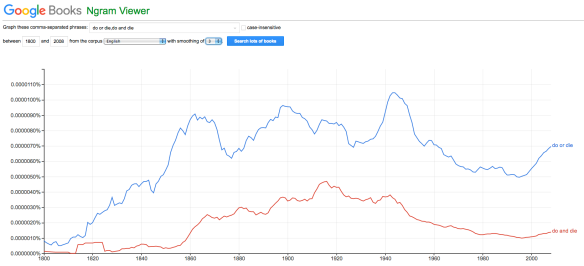
What fun making NGrams can be. Go to Google Books Ngram Viewer and plug in your word or phrase (separated by commas, if you want to make comparisons).
FYI, here’s the NGram for “Charge of the Light Brigade”:
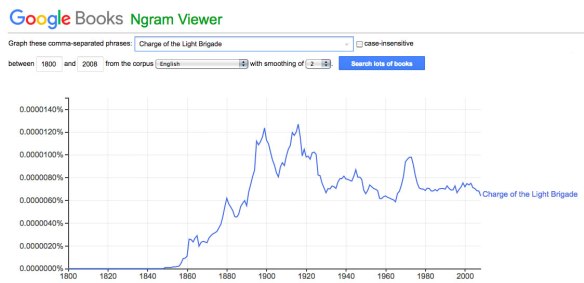
In the highly unlikely event that someone wants to follow this up, I have put together an incomplete, unsequenced and largely unedited list of articles featuring “Do or Die” and “Do and Die” published in the last few days.
THIS IS PROBABLY THE BEST-KNOWN and most widely reproduced image of the Charge of the Light Brigade:
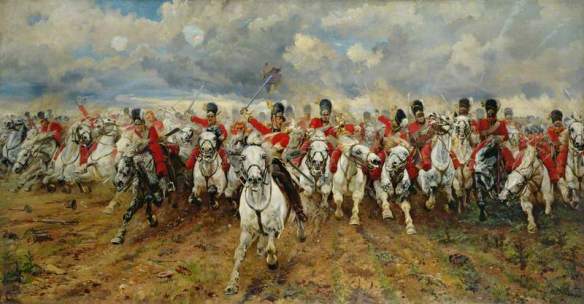
Elizabeth Southerden Thompson, Lady Butler, “Scotland for Ever”, 1881, Leeds Art Gallery, (Larger version here.)
But just so you know, it’s actually not the Charge of the Light Brigade. It’s the wrong cavalry (heavy brigade not light), and the wrong enemy (France not Russia), and even the wrong war (Napoleonic not Crimean). Above all, this Charge had the opposite outcome (it ended in victory).
The original painting is Elizabeth Butler’s Charge of the Royal Scots Greys at Waterloo in 1815, known as “Scotland For Ever” – an event that took place nearly four decades before the catastrophic Light Brigade Charge at Balaclava (25th October 1854).
Here are some more examples of Not-the-Charge-of-the-Light-Brigade.
PB: Thursday 17th January 2019
MANY THANKS to correspondents for their most interesting comments on what people may or may not know about the Charge of the Light Brigade, and what the Charge “means” today.
I imagine very few people today have much of an idea of who/why/when/what the whole thing was about. But I may be wrong.
So in the interests of sociological and historical research, readers would do me the greatest favour if everyone would ask three people – young, old, whoever – what the phrase “Charge of the Light Brigade” suggests to them. (If anything.)
Perhaps you could probe a bit. Do they know it chiefly as a poem or as a military event? Both? Do they know the poet’s name? Can they identify the war? And do they have a rough idea of when it took place? Of who was fighting whom, and with whom? Of other battles? Of famous participants?
My own findings, admittedly based on a tiny and skewed sample (I don’t get out much), are not too encouraging. Even many university arts graduates don’t have much of clue, though there are some impressive exceptions.
On the other hand, if you push and prompt a bit and you do get some light-bulb moments: Florence Nightingale, Mary Seacole, the pub at the corner that shares its name with Great Aunt Alma.
That said, thanks largely to Tennyson (and a couple of blockbuster films), but also to countless small references in popular culture (which I try to keep some record of in the EJB Archive), the “Charge” looks like sticking around in the national consciousness for at least some time to come.
In the meanwhile, for anybody in need of a refresher course on the Crimean War here is Sellars and Yeatman’s “Memorable History of England comprising all the parts you can remember” that is 1066 And All That (first published 1930):
“THE CHARGE OF THE FIRE BRIGADE
The Battle of Balaclava, famous for the Charge of Fire Brigade by Lord Tennyson and 599 other gallant men who, armed with Cardigans and Balaclava helmets, advanced for a league and a half (4 1/2 miles) and back (9 miles), with the object of proving that someone had thundered the wrong order. (In which they were completely successful.)”
And of course we shouldn’t forget Flora MacNightlight, The Lady with the Deadly Lampshade…
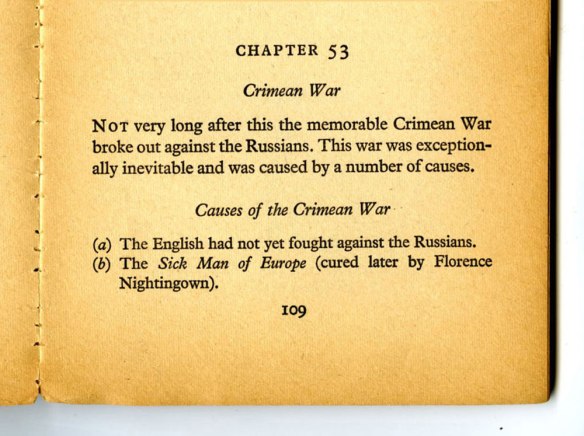
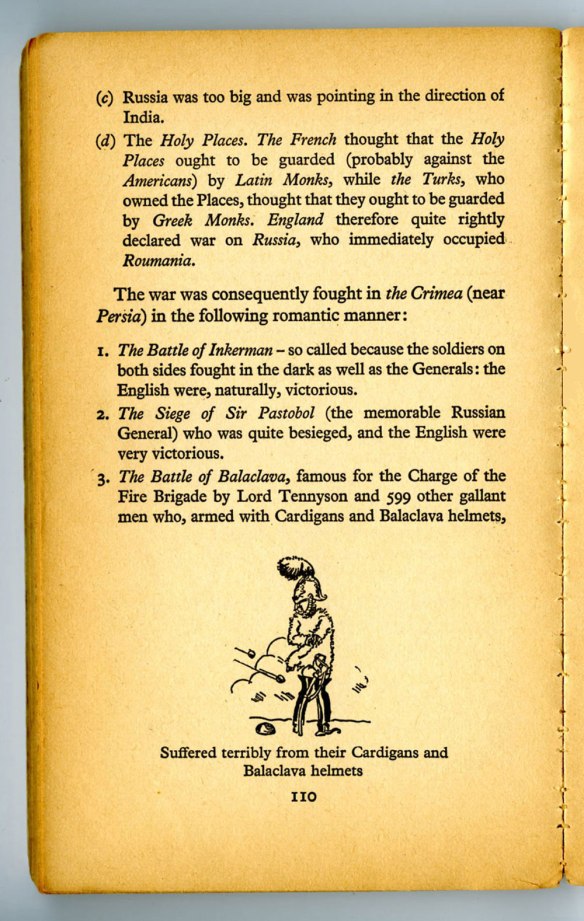
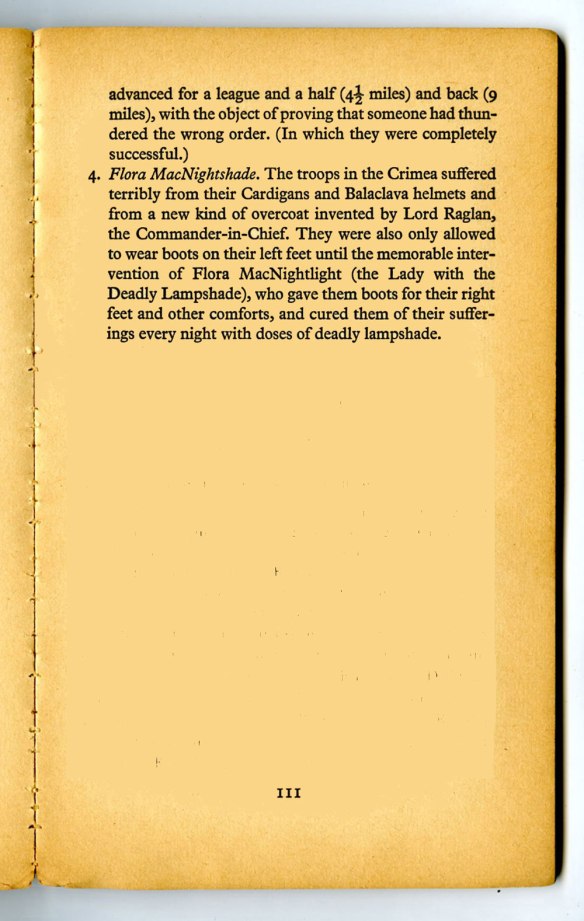
PB: Wednesday 9th January 2019:
Ever since the referendum in 2016, I’ve been collecting articles, blogs, cartoons and other references that compare Brexit to the Charge of the Light Brigade. All use the Charge – the event itself but also phrases from Tennyson’s Charge poem – as a rich ragbag of metaphors: for a headlong rush, for recklessness, for a futile attack on a very much stronger enemy, for self-destruction, for blind obedience to orders, for exposure to attack from every side, for miscommunication, for a lack of clarity about objectives, for a massive blunder by a remote, utterly incompetent (and largely contemptible) leadership. However, in modern usages there is rarely a hint of glory or nobility or bravery or honour. Just the certainty of imminent disaster.
Here are some typical headlines:
I have written about this before, but there have been innumerable examples since. Yes, the Charge has become a cluster of cliches. But it’s almost as if commentators are at a loss to know how else to describe the enormity of the folly of Brexit. (Though it does raise the question of what readers actually “know” about the Charge itself – something I hope to return to in a later post).
Most who deploy the Charge metaphor are Remainers, but not all – here for example is the Tory ex-cabinet minister Andrew Mitchell (he of “Plebgate” fame), speaking just a few hours ago…
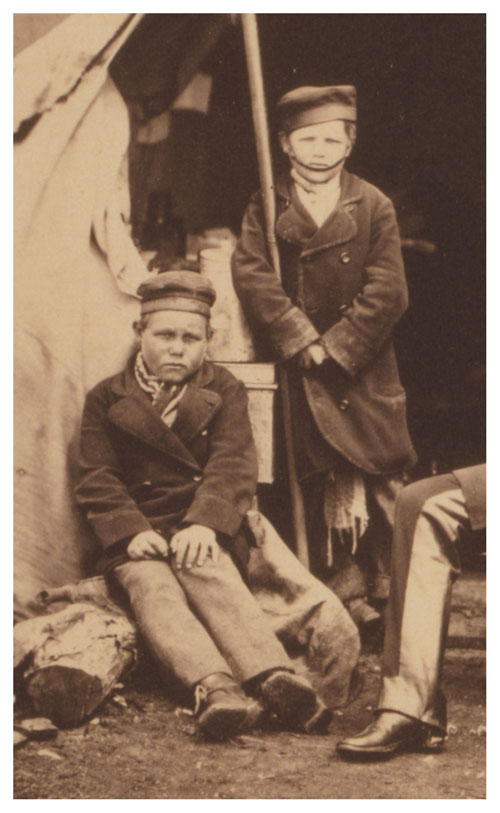
Yet there was curiously little information in the caption to the photograph, or in the audio commentary, or in Sophie Gordon’s fine book that accompanies the exhibition.
Photograph of Colonel Brownrigg by the entrance to a tent with two young Russian boys called Alma and Inkermann. Colonel Brownrigg, wearing military uniform, sits on a metal chair facing partly left with his left hand resting on a gun. One boy sits on a log and the other stands beside him to the right with his right arm wrapped around a tent pole.
[Source: Royal Collection Trust: Roger Fenton, “Colonel Brownrigg and the two Russian boys, Alma and Inkermann, 1855. There is another (rather less intimate) Fenton photograph of Brownrigg here. ]
I have spent the last couple of weeks trying to find them.
After the distraction of the Referendum, I promised that my next blog would explain what links a pair of identical twin harpists, the Heavy Metal band Iron Maiden, historian Terry Brighton, the number of the Beast of the Apocalypse, a bottle of beer — oh, and the Charge of the Light Brigade.
To start with, here are the identical twin harpists, Camille and Kennerly, The Harp Twins:
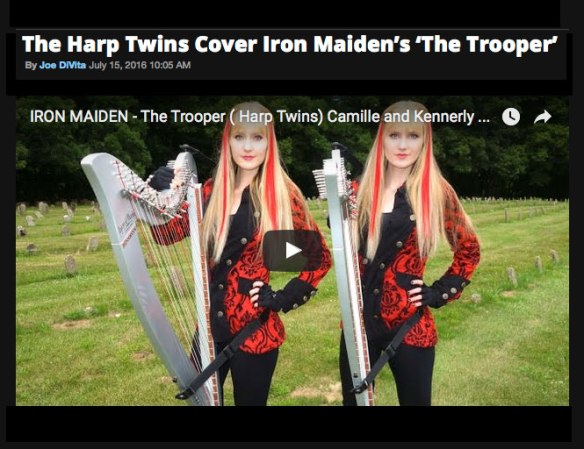
“The Harp Twins, the identical twin duo of Camille and Kennerly who have done dazzling renditions of metal classics from bands like Metallica, Nightwish and Megadeth, are back with another all-time classic: Iron Maiden’s The Trooper.” [Link: http://loudwire.com/the-harp-twins-cover-iron-maiden-the-trooper/?trackback=tsmclip%5D
When I got up this morning, I firmly intended to write about what connects Light Brigade-historian Terry Brighton, the number of the Beast of the Apocalypse, the Heavy Metal band Iron Maiden, a pair of identical twin harpists, and a bottle of beer.
But you’re going to have to wait for that one because I got distracted by, yes, the Referendum.

In the last month or so I’ve noticed that “Charge of the Light Brigade” has been the metaphor-of-choice for describing the EU Referendum (so much more sophisticated than Turkeys voting for Christmas or Frying Pans and Fires).
Here’s one, from Inside-Poland.com:
As Great British Cock-ups Go, Brexit is on a par with the Charge of the Light Brigade
“As own goals go, Brexit was a classic. Not since Lord Cardigan pointed his handful of troops at a heavily defended Russian artillery unit and gave the order “up and at ’em, lads” has there been such a spectacular cock-up in the name of ‘defending British interests.’ “
Finally, after many months, we have some firm evidence about the alleged epitaph to the station-master “James Bosworth” who, according to the Wikipedia article on The Charge of the Light Brigade, had been run over and killed by a railway engine: “In his younger days he was one of those who had fought at the Battle of Balaclava and survived.”
I wrote about this rather sceptically last year, after which Nick Miller got in touch with some very useful info: “James” was in fact “John”, and he certainly wasn’t in the Charge, but he had fought in the Crimea, had been a Station Master, and had indeed been killed by a train. But it still remained to be seen whether his gravestone (which Nick had tracked down to a cemetery in Southampton) did in fact say:
Though shot and shell flew around fast,
On Balaclava’s plain,
Unscathed he passed, to fall at last,
Run over by a train.
Nick has written once again to say that he has now visited the grave. Continue reading
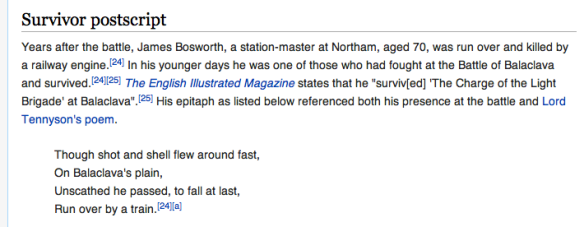
In my last blog I argued that this “survivor postscript” should be removed from Wikipedia’s Charge of the Light Brigade entry, because no one of that name rode in the Charge. Moreover, I had even “come to doubt that James Bosworth was ever a station-master at Northam… on the now-closed Bideford, Westward Ho! and Appledore Railway in North Devon”, and that there was definitely no memorial to him in Northam, Devon.
But now I have to eat some humble pie. Continue reading